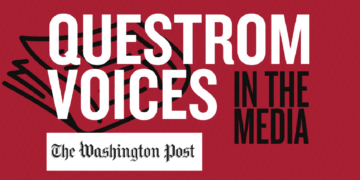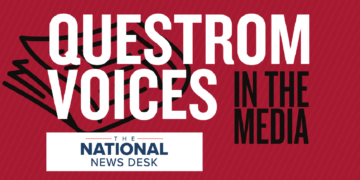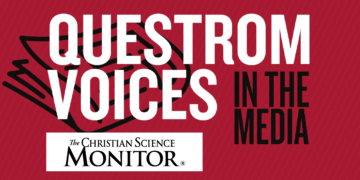The pandemic and subsequent economic downturn have forced companies to readjust their business models and pivot quickly to adapt to new needs and constraints. Professor of Strategy & Innovation Siobhan O’Mahony and Strategy & Innovation Research Assistant Veronica Escobar-Mesa sit down with Insights@Questrom to answer our questions on the importance of innovation in firms, especially during an economic downturn.
More specifically, in the short-term, how can companies foster innovation in their companies to adapt quickly to emerging trends? Long-term, how should companies organize themselves to maintain a culture of innovation?
Question 1: Why is an innovative company culture important to a firm’s overall success?
Culture is important to innovation as it shapes individuals’ willingness to engage in the activities needed for innovations to develop – to take risks, recombine ideas, prototype and test them. All of these activities are risky with a reasonable probability of failure. When a culture is rigid, people are less willing to share, try and test their new ideas and this can lead to a decline in innovative activity and thus a decline in the rate of new concepts introduced to market. Without an environment that encourages people to take action to develop their ideas, innovations will not reach the incubation stage and the flow of new ideas will be stymied. Over time this can lead firms to rely more on their existing competencies without renewal, which can eventually affect firm performance.
Question 2: What impact does an economic downturn have on a company’s ability to strategize and innovate?
When companies face economic threats, it is easy to respond not only by cutting slack resources out of business necessity but also by freezing the resources allocated for innovation. Many leaders consider innovation projects easy candidates for cost-cutting, as their impact on current operations is perceived to be minimal. This is called the “threat rigidity effect” where organizations become rigid rather than adaptive in threatening situations (Staw et al., 1981). When confronting a threat to existing operations, two challenges emerge. First, leaders tend to restrict information processing—narrowing their field of attention and reducing the number and range of information channels used. But this can be counterproductive and hamper the ability to recognize and adapt to changing conditions. Second, leaders often create new controls that concentrate power at higher levels of the hierarchy, inhibiting agility and adaptation to new circumstances. These responses may insulate the organization from immediate failure but may be maladaptive when fundamental changes are needed to align the business with the demands of the future.
Question 3: In the short-term, what can companies do to quickly innovate to meet immediate needs?
- Consider how customer needs are changing and how to maintain relevance with existing capabilities and resources. For example, can you innovate your existing offerings in environmentally friendly ways? Downturns are a great time to explore how to innovate in “clean” ways that enhance your value proposition by cutting costs for customers or others in the value chain (Laperche et al., 2011).
- Reevaluate your revenue dependence on others and look for ways to diversify sources of revenue in under-explored or adjacent markets. One study found that firms that were too dependent on export market sales stopped investing in innovation projects and were less likely to rebound (Paunov, 2012).
- Keep investing in innovation but identify partners in your value chain that may be able to help. Consider how to reduce risk by pursuing a project as a customer or supplier instead of bringing a new product to market on your own. Taking a smaller role can reduce development costs (Chesbrough and Garman, 2009).
Long-term, what strategies should companies utilize to foster innovation in their organizations? - Pair cost reductions with R&D investment. Firms that “saved their way out” of the 2008 crisis (by reducing workforce and capital expenditures) had lower performance post-crisis unless such reductions were coupled with efforts to “invest their way out.” Maintaining investments in R&D and corporate social responsibility helped firms better understand the changing needs of customers and stakeholders (Flammer & Ioannou, 2019).
- Replenish the innovation pipeline. When initially confronting tough economic conditions, firms typically reprioritize existing innovation projects and long-term projects are shelved. As conditions continue beyond the time expected, the question becomes how to replenish the pipeline to keep offerings relevant. This problem may not appear until a year or two from now. To avoid this, figure out ways to keep your long-term innovation team engaged in projects that can also feed the short term. Encourage diverse teams to search broadly, and selectively conduct cheap experiments to assess viability for both the short and long term and empower people to conduct cheap and quick experiments.
- Diversify collaboration partners. When it is difficult to create organic growth, grow your ecosystem. When Fiat cut their R&D budget by about 70%, they started collaborating and learning from competitors and from other industries, building a diverse network that helped introduce innovative processes (Di Minin et al., 2010). Collaborating with diverse partners can foster identification of new opportunities, counterbalance weak internal resources, enhance a firm’s resilience, and help keep your team current (Chesbrough and Garman, 2009; Laperche et al., 2011).
- Avoid the urge to reorganize, and invest in technologies or innovations that enhance capabilities. Reorganization is attractive to managers as it looks like you are accomplishing something but all that you may be accomplishing is confusion. A study of 2,329 new ventures in the Netherlands facing the 2008 economic crisis found that organizational changes were detrimental for survival, while technological innovations that enhanced innovation capabilities entailed a more enduring premium post-crisis (Cefis and Marsili, 2019).
- Explore new strategic uses of intellectual property. Can you license innovations that are on the shelf or not being developed internally? Can you craft an open innovation strategy if you do not have one already? R&D leaders from eight industrial firms (Renault, Thales, General Electric, Lesieur, PSA Group Automotive, Saint-Gobain, Valéo, ArcelorMittal) confronting the 2008 economic crisis not only rationalized R&D expenses and amplified their open innovation strategies, but also developed strategic ways to leverage their intellectual property through licensing deals or patent sales (Laperche et al., 2011).
Question 4: Is there anything else you feel is important for people to know about corporate innovation?
The firms that figure out how to keep their innovation labs, projects or centers alive and thriving during this pandemic will be better positioned to rebound. If you are able to protect the resources needed to keep innovation alive, then the next thing to worry about is how to refresh your people and the pipeline of ideas. As we hit a year into this pandemic, people will need to be creative about new ways to create variance or the requisite variety needed to foster novelty. Novelty comes from new ways of recombining existing ideas or from introducing new ideas to what exists already. Tap your team’s collective creativity to develop a menu of ways to introduce novelty given the constraints we are all working in.
References
Cefis, E. & O. Marsili. 2019. “Good times, bad times: innovation and survival over the business cycle.” Industrial and Corporate Change 28 (3): 565-587.
Chesbrough, H. W., & Garman, A. R. 2009. How open innovation can help you cope in lean times.” Harvard Business Review, 87(12): 68-76.
Flammer, C. & Ioannou, I., 2020. “To save or to invest? Strategic management during the financial crisis.” Boston University/London Business School Working Paper.
Laperche, B., Lefebvre, G., & Langlet, D. 2011. “Innovation strategies of industrial groups in the global crisis: Rationalization and new paths” Technological Forecasting and Social Change 78(8): 1319-1331.
DiMinin, A., F. Frattini & A. Piccaluga. 2010. “Fiat: open innovation in a downturn (1993–2003)” California Management Review 52(3): 152-159.
Paunov, C. 2012. “The global crisis and firms’ investments in innovation” Research Policy 41(1): 24–35.
Staw, B.M., Sandelands, L.E.& Dutton, J.E., 1981. “Threat rigidity effects in organizational behavior: A multilevel analysis.” Administrative Science Quarterly 26 (4): 501-524.






















![[Deutsche Welle] The Scientific Innovation Sparked by the Pandemic](https://insights.bu.edu/wp-content/uploads/QUESTROM-EXPERTS-1-360x180.png)

